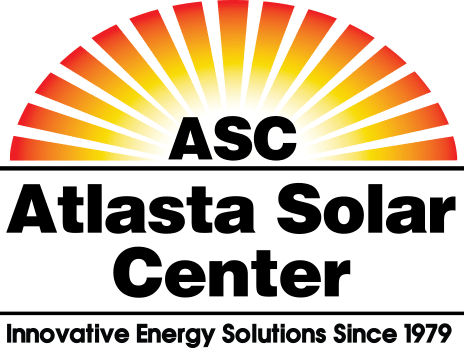
What is Solar Energy?
Solar energy is radiant light and heat from the sun that is harnessed using various technologies, such as solar panels, to generate electricity or provide heating and cooling for residential, commercial, and industrial applications. It is a renewable and sustainable source of energy that is abundant and environmentally friendly.
Solar Energy, also known as the “Greenhouse Gas Emission Killer”, can run anything that electricity generated by fossil fuels can power, just without all the environmental trauma and dirty emissions.
At Atlasta Solar Center, we’re on a mission to power a brighter, sustainable future for all. As a leading provider of solar panel solutions, we offer innovative, reliable, and cost-effective solar energy systems tailored to meet your unique needs.
How do Solar Panels work?
Solar panels work by converting sunlight into electricity through a process called the photovoltaic effect. Each solar panel is made up of many solar cells, typically composed of silicon semiconductor materials. When sunlight hits the solar cells, it excites electrons, causing them to move, creating an electric current.
Benefits of Solar Energy
1. Renewable: First and foremost, solar energy is abundant and renewable, making it a sustainable source of power.
2. Clean: Solar energy production produces minimal greenhouse gasses and other types of pollution, making it environmentally friendly.
3. Versatile: Solar energy can be used for various applications, including electricity generation for residential, commercial, and industrial purposes, as well as heating water and space.
4. Cost-effective: The cost of solar panels and installation has decreased significantly over the years, making solar energy increasingly affordable and economically viable.
5. Off-grid capability: Solar energy can provide electricity in remote areas without access to the traditional power grid, through standalone solar systems with batteries for energy storage.
6. Longevity: Solar panels typically have a long lifespan and require minimal maintenance, providing reliable energy production for many years.
7. Government incentives: Many governments offer incentives, such as tax credits and rebates, to encourage the adoption of solar energy systems, further reducing the initial investment cost for homeowners and businesses.
Solar energy represents a promising solution for reducing reliance on fossil fuels and combating climate change while providing a sustainable and reliable source of power.
The three main types of solar power systems are:
1. Grid-tied systems: These systems are connected to the electrical grid and do not require batteries. They generate electricity from sunlight during the day, and any excess electricity can be exported to the grid for credit or compensation. Grid-tied systems are the most common type of solar power system and provide electricity when the sun is shining and the grid is operational.
2. Off-grid systems: Off-grid systems are not connected to the electrical grid and rely on batteries to store excess electricity generated during the day for use at night or during periods of low sunlight. These systems are often used in remote areas where grid connection is impractical or expensive. Off-grid systems require careful sizing and management of battery storage to ensure reliable power supply.
3. Hybrid systems: Hybrid systems combine elements of both grid-tied and off-grid systems. They are connected to the electrical grid but also have battery storage to provide backup power during grid outages or to store excess electricity for use at night. Hybrid systems offer increased energy independence and resilience compared to grid-tied systems alone, while still allowing for grid connection and potential energy export.

Why is Solar Energy important?
The importance of Solar energy can be acknowledged across various domains, ranging from environmental sustainability and economic prosperity to energy security and social equity. Embracing solar power as a primary energy source not only addresses the urgent need to mitigate climate change but also fosters resilience, innovation, and inclusivity within communities.
At its core, solar energy is a key driver in the transition towards a sustainable and low-carbon future. Unlike finite and harmful fossil fuels, solar energy is renewable and abundant, offering a clean alternative to traditional energy sources.
By harnessing the power of sunlight, solar technologies produce electricity with minimal environmental impact, significantly reducing greenhouse gas emissions and air pollution. This reduction in carbon emissions plays a pivotal role in combating climate change, safeguarding ecosystems, and protecting human health.
The Solar Industry
The widespread adoption of solar energy promotes economic growth and job creation on both local and global scales. The solar industry encompasses a diverse range of sectors, including manufacturing, installation, maintenance, and research, providing employment opportunities for millions of people worldwide.
Unlike conventional power plants, solar installations can be distributed across diverse geographic locations, reducing vulnerabilities to centralized energy systems and potential disruptions. This decentralization of energy production empowers communities to generate their own electricity, increasing resilience against natural disasters, grid outages, and geopolitical instability.
Solar Solutions
Solar energy systems also offer a scalable solution for extending electricity access to underserved populations, particularly in remote or off-grid areas where traditional infrastructure is lacking.
In addition to its environmental and economic benefits, solar energy plays a pivotal role in advancing social equity and environmental justice. By democratizing access to clean energy resources, solar power empowers marginalized communities, including low-income households, to participate in the renewable energy transition.
Initiatives such as community solar programs, workforce development initiatives, and equitable financing options help ensure that the benefits of solar energy are accessible to all members of society, regardless of socioeconomic status or geographic location.
The Road Beyond
Solar energy is a transformative force that holds immense importance for society in the 21st century and beyond. By harnessing the power of sunlight, solar technologies offer a sustainable, resilient, and inclusive energy solution that addresses pressing environmental, economic, and social challenges.
Embracing solar energy not only accelerates the transition towards a carbon-neutral future but also fosters a more just, prosperous, and sustainable society for generations to come.
Join the solar revolution with Atlasta Solar Center and take control of your energy future today! Contact us to learn more about how solar energy can benefit you and your community. Let’s work together to create a cleaner, brighter world for generations to come.
Grand Junction Office
- Phone: (970) 248-0057
- Fax: (970) 248-0094
- Hours: Mon – Fri – 8 am – 4 pm
- 1111 South 7th Street, Grand Junction, CO 81501
Montrose Office
- Phone: (970) 249-SUNN (7866)
- Fax: (970) 248-0094
- admin@atlastasolar.com
- 3060 Aerotech Parkway, Montrose, CO, 81401
